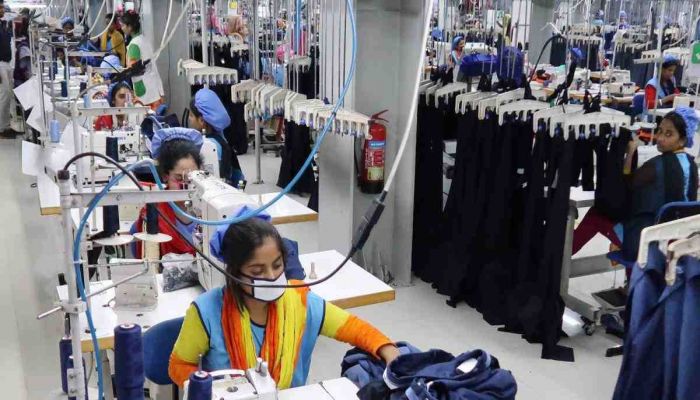
Desk Report
Publish: 24 Apr 2020, 01:52 pm

A new survey showed that about 69% of ready-made garment (RMG) workers who used to send money to their families in villages stopped doing so after the coronavirus outbreak.
Seventy-six percent of female workers and 61 percent of male workers did not send money to their families, said Innovation Consulting, a Dhaka-based international consultancy providing research, technical assistance, and project management services to multilateral and bilateral donor agencies.
According to the results of the report, 97% of employees would stop sending money to their villages if they do not earn salaries for the month of April.
"The data is comparable for male and female staff-52% of respondents indicated that the food intake of family members in the villages would be impaired if employees choose to refrain from sending money," he said.
This is followed by 7 percent education, 14 percent repayment of the loan, 11 percent clothing, 9 percent entertainment, and 4 percent savings, she added.
Innovation undertook a report called 'Deep Dive on Bangladesh RMG employees in identified clusters' to determine the effect of COVID-19 on low-income occupational classes on their livelihoods.
“We undertook a simple random sample survey on 84 garment workers from seven garment factories of Gazipur, Narayanganj, and Mymensingh,” the survey firm said adding that the data presents the status of the workers in factories that can be termed as progressive.
These factories have been working with development partners on Occupational Health and Safety (OHS), workers’ health, empowerment, and rights issues.
The Innovation collected the data from April 7-9 which coincided with the salary payment date on April 7. It used Computer Assisted Personal Interviewing (CAPI) method for the survey. It also used KoBoToolbox to collect the data on tab through phone survey.
The outcome of the report offers in-depth insights into how the income and spending habits of low-income communities are changing as a consequence of the closure, how families are coping, and what steps can be implemented to help them.
According to the report, some 85 percent of respondents claimed they had money in their hands to pay for some period.
“These respondents currently have Tk 3,686 as cash in hand on average. This can support their family expenses (food and non-food) for 16 days,” revealed the survey.
All RMG workers reported that their factories are currently closed (April 7-9 data). Twenty-four percent of the respondents had already returned home to their community, while 76 percent were still staying on the premises on which they attended their job.
A higher number of male employees (33 percent) returned to villages relative to female workers (14 percent), according to the report.
About food expenditure, the surveyed respondents said they have reduced food expenses by 27 percent.
“Before the closure of their work, the workers used to spend on average Tk 266 per day on food consumption which has been reduced to Tk 193,” it said adding that reduction in per day food expense is higher for the female workers (32.5 percent) compared to the male workers (20.7 percent).
About access to the mobile-banking account, some 79 percent of the respondents have mobile wallets – 83 percent male workers and 74 percent female workers.
Some 54 percent of the respondents are currently paid salary in cash, 33 percent are paid through mobile account and 13 percent are paid through bank accounts.
Source: UNB
Subscribe Shampratik Deshkal Youtube Channel
© 2024 Shampratik Deshkal All Rights Reserved. Design & Developed By Root Soft Bangladesh